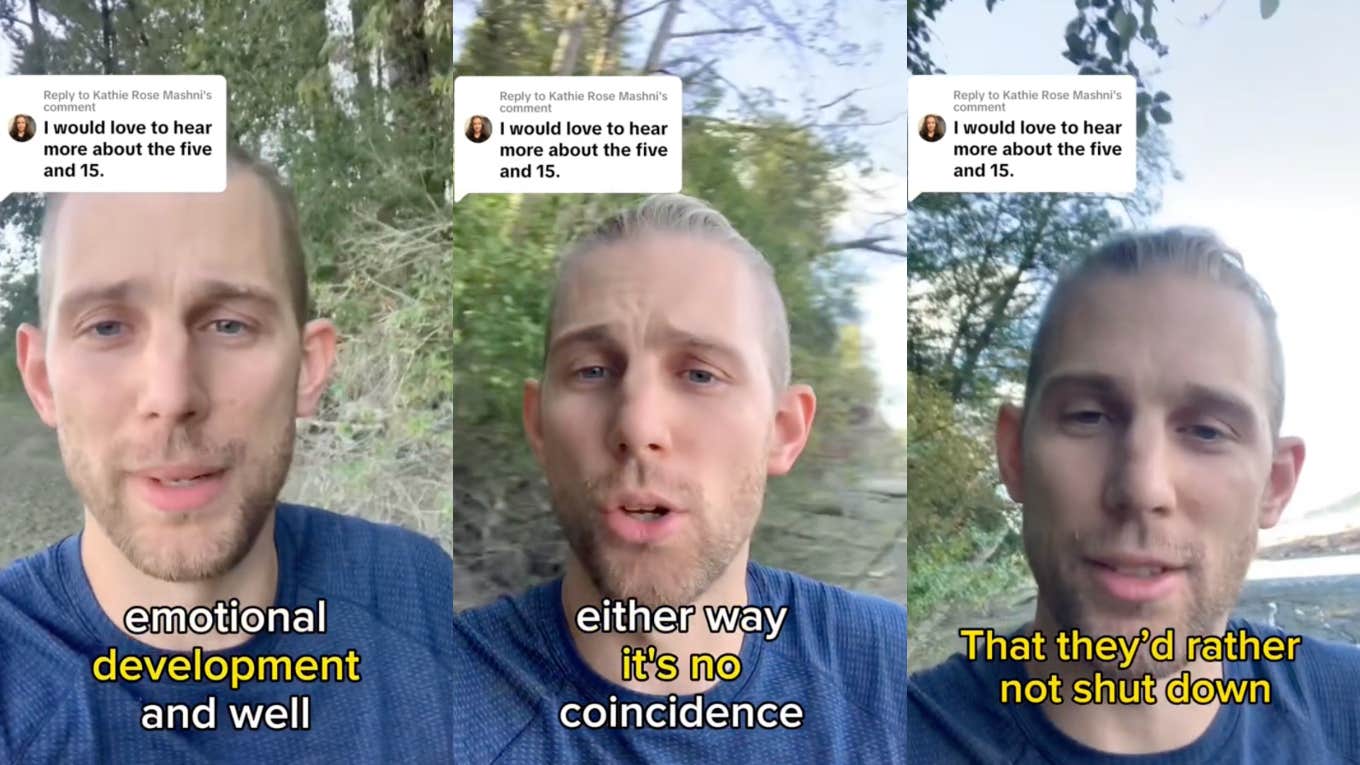Teacher Turned PhD Explains The Crisis That Happens With Boys Specifically At Ages 5 & 15
He acknowledged that young boys often feel the need to suppress their authentic selves because of societal pressures and gender stereotypes.
 @remasculine / TikTok
@remasculine / TikTok In a video that has sparked an interesting conversation, Brendan Kwiatkowski, a teacher from Canada who has his Ph.D. in Education, explained how a young boy's perception of himself and his emotions often shifts around two distinct ages.
Kwiatkowski's theory of 'the boy crisis' happens at ages five and 15.
Brendan, who is a researcher of the social and emotional well-being of boys and men, explained in his video that when young boys are 5 and 15, respectively, they often become disconnected from the authentic parts of themselves, usually having to do with the emotional parts.
At age 5, boys often start suppressing certain parts of their personalities.
"Prior to the age of 5, boys tend to be more emotionally expressive than girls, however, that shifts around that time period where boys become less verbally expressive than girls do," Kwiatkowski said. "Although their somatic markers for emotional reactivity do not change."
He continued, pointing out that because of this observation, it's more likely that boys are simply repressing their emotions compared to being incapable of feeling them. Kwiatkowski also acknowledged that during this time of a young boy's life, they begin to realize that two emotions, in particular, aren't acceptable for them to show: fear and sadness.
"Some of this is due to implicit bias as mothers and fathers tend to use less emotional language when talking to their sons as compared to their daughters, particularly about events that might be sad or scary," Kwiatkowski informed. "Some of it can be more intentional as parents tend to be more concerned about their sons being seen as too feminine than they are about their daughters being seen as more masculine."
He also explained that this first boy crisis coincides with the start of school for young boys, where they are exposed to more social shame and are almost forced to suppress certain parts of their personalities for fear they will be seen as "more masculine." For example, Brendan claimed that if a boy were to come to school and say he likes unicorns, it would be labeled as being "girly," which can be the start of them shutting down those parts of themselves.
 Photo: 2xSamara.com / Shutterstock
Photo: 2xSamara.com / Shutterstock
This perspective is interesting, especially when considering the stereotypes that women are more emotional than men when in reality, that's not the case. According to a study published in the journal Nature, it was found that out of 142 men and women whose positive and negative emotions were tracked over 75 days, men's and women's emotional stability and fluctuations are "clearly, consistently and unmistakably more similar than they are different."
Young boys and men are expected to be stoic, strong, and emotionless, while women are expected to be caring, nurturing, empathetic, and emotional. The repercussion of boys adhering to these outdated gender norms means that from a young age, as Kwiatkowski pointed out, they are forced to suppress these parts of themselves for fear of being perceived as "weak" and not "manly enough."
At age 15, boys begin to think more about how they are seen by their peers.
"The second boy crisis happens around the age of 14/15 with the transition to high school. You have puberty and all the insecurities that come along with that. You have changing social dynamics and trying to posture and fit in," Kwiatkowski remarked.
He also acknowledged that during this time, young men are often entering their first romantic relationships and starting to develop intimate feelings for other people. During this time as well, it's the beginning of teenagers starting to care how they are perceived by their friends and schoolmates, and starting to care less about how their parents see them.
 Photo: Monkey Business Images / Shutterstock
Photo: Monkey Business Images / Shutterstock
"You have the cesspool of insecurity and uncertainty, and this is when the masculine pressures to be manly, namely restrict your emotions and be physically and mentally tough are the highest."
Kwiatkowski explained that in his own Ph.D. research of boys in their senior year of high school who are between the ages of 17 and 19, all of them agreed that when they were 14 and 15, it was when they felt that they were the "least authentic" version of themselves and had to wear this mask of masculinity to fit in, especially when they were at school.
Masculinity isn't toxic in and of itself, though many 'masculine' beliefs and behaviors are 'restrictive.'
On his website, Kwiatkowski provided information about how the idea of masculinity is not inherently harmful, but that the beliefs and behaviors often associated with masculinity are.
"It is harmful if the masculinity you embody is rigid and disconnects you from your emotions, ignores the need for community, and seeks to control others," he wrote, calling this type of behavior, "restrictive masculinity."
The journey of young boys is undoubtedly complex as they try to wrestle and come to terms with their emotions in a world that constantly tells them to suppress them. Such a thing is why we must continue to challenge these rigid notions of what is considered the "good" parts of masculinity compared to the "bad" parts, and just how much gender stereotypes do nothing but harm and limit a boy's choice to be expressive with his emotions.
Nia Tipton is a Chicago-based entertainment, news, and lifestyle writer whose work delves into modern-day issues and experiences.

